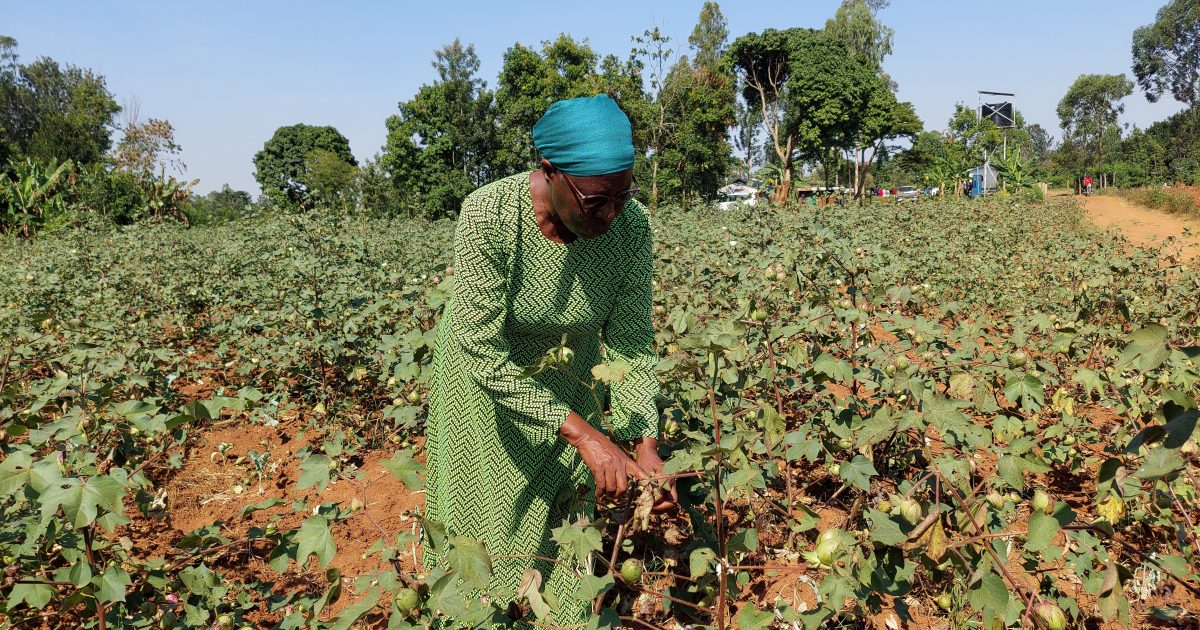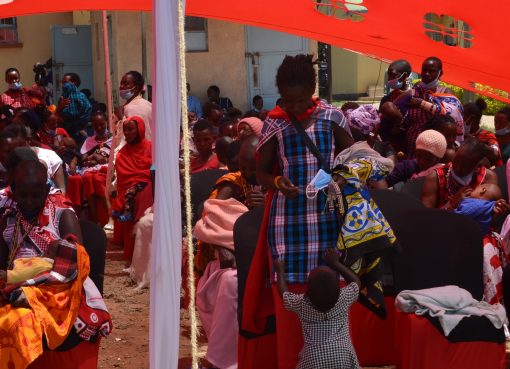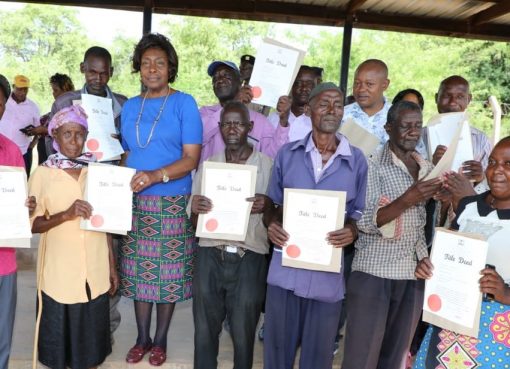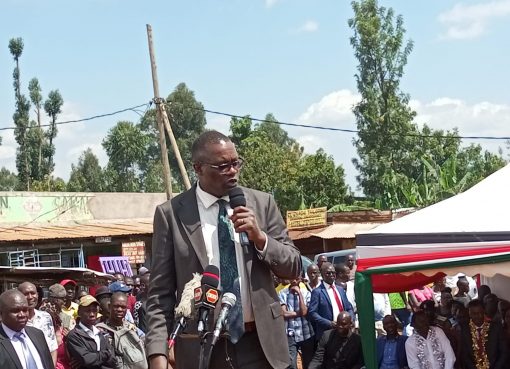The government has stepped up efforts to revive the textile sector following the introduction of a certified cotton seed system to boost production of raw materials for the industry.
The deliberate initiative to revive once thriving sector comes as the Kenya Agricultural and Livestock Research Organization (KALRO) was working on modalities to develop the first ever certified cotton seed system in the country.
Teresia Okiyo a plant breeder in charge of the cotton research Programme at KALRO centre in Kibos said the branded cotton seed were certified and may soon be availed to all cotton farmers to encourage commercial production of the cash crop.
The government had offered at least 17 tonnes of BT cotton seeds to farmers in Busia County which was rolled out as a template trial in the wider government plan to enhance agricultural value chains across the country.
Okiyo explained that, in 2017, the Kenya government through KALRO fibre crops directorate trained by the Brazil cooperation agency on how to develop cotton seeds before they partnered with their Tanzanian and Burundian counterparts in the project dubbed “Cotton Victoria” tailored to improve seed varieties in the sector through capacity building and training of farmers.
“Through this project they were able to undertake a feasibility study that saw KALRO develop high yielding cotton varieties including KSA 81M and Hart 89M varieties suitable for ecological zones in Western and Eastern regions respectively” she said.
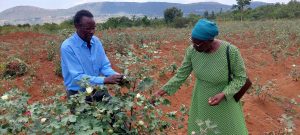
Okiyo revealed that KALRO planted 14 acres of the seeds at Kibos centre while another 20 acres were under cultivation at the Mwea field station.
“We started bulk production of the early generation seeds towards producing of certified seeds and in 2018 we did generation one and in 2019 also but this year we managed to brand cotton seed that is certified and we believe that with time we are going to provide all our farmers with quality seed” she added.
She however noted that the seeds planted at their centres will be further multiplied as some contracted farmers were also involved in seed production to boost supplies.
“This project is going to set an entire seed system to promote mass production at a bigger scale for the first time in the country since cotton was introduce and I think this is a real plus for us to be involved in the project”, Okiyo said confirming that the critical equipment’s were already in place to spur production.
Okiyo said gone are the days when farmers relied on seeds from the ginnery to plant and that there was never a system of producing of certified seed for planting where good farming practices were ignored including good agronomy like spacing, weeding, crop protection leading to poor quality yield
The government spent a lot of resources to put up a brand new ginnery in Mulwanda area in Busia with a huge capacity to absorb all the cotton being produced in this region, a relief for farmers who will no longer lack market for their produce.
“Farmers, she added, will no longer talk about having nowhere to sell since the government had also set a minimum price at Ksh 55 and this could even rise” she said.
Okiyo encouraged farmers to make informed choices and bargain for better prices saying the tropical environment was more promising for production save for the challenges posed by weeds if not checked could bring about almost 50 percent loss in one’s field
“Many of our farmers were never weeding, so we have a weeding trial and we have established that if a farmer weeds within the first 30 days of crop emergence and the another one at 60 after, the crop smothers weeds and we are therefore recommending just two weeding season per season and the farmer will be able to harvest a very good crop”, she said
KALRO, she said, is training farmers on production management especially now that for Cotton whether one uses organic farming, it has to be sprayed though not in blanket sprays but farmers can scout and spray if the insect damage reaches some threshold.
Overall, Okiyo advised farmers to follow Good agricultural practices when it comes to pest control, also to do crop rotation by breaking the plant with cereals and legumes, and also practice intercropping the cotton with determinant legumes be it beans, cow peas or even pulses such as green grams as well as work in groups so that they can have economy of scale and bargaining power during sale.
Dennis Mapesa, from Nambale Sub County and who has been a cotton farmers after inheriting his parent’s farm said he grew up with proceeds of Cotton sales but abandoned the crop at some point due exploitation from brokers as yields dropped making the venture uneconomical.
He however was optimistic this time round with the fresh impetus from the government saying “I have picked it up again after the government came with the goodies and the ministry of Agriculture has continued to assist us in planting cotton,
He acknowledged that he has been planting the KSA81 M variety which has been doing well but with the introduction of other varieties which he has also tried, he noted that the government needs to guide them on the GAP since one of the varieties failed completely in his farm.
“This time around this season I have planted a variety called MAHYCO C 571 a new variety and I am trying it for the first time. it has challenges some challenges and I think it is due to lack of proper sensitization and knowledge of the seed from the experts”, he said
Mapesa thanked the national government for the Bottom Up Economic Transformation Agenda (BETA) plan that has resurrected cotton industries and also the need to add an industrial park to increase the cotton market.
“I want to thank the president and the ministry of agriculture for all they have done to ensure that they resurrect cotton farming in Busia county and the current market price for the cotton plant which has seen some of us getting Ksh 200,000 out of one acre”, the youthful Mapesa said and encouraged other young farmers to join the venture.
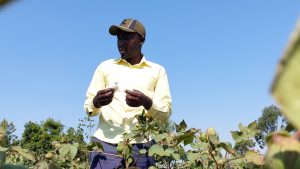
Vincent okumu, another farmer from Bwiri farmers society in Samia said the transformation in cotton sector in the country is huge as recalls when growing up that his parents used to earn 2 pennies for I kg of Cotton
“I have farmed cotton since parents started farming in the 1960s to the 1970s. I grew into it but overtime I saw it dwindle little by little in 2003 because of lack of recognition and brokers but now the Government has given us power by bringing us the seeds needed for planting and it has also provided us with markets from Rivatex and Thika Cloth Mills”, he said
Cotton was introduced in Kenya about a century ago and it was then a very vibrant sub –sector positioning at number three employer after TSC and civil service. The sector and crop started falling down as there were no structures in place like seed production, the marketing was not well streamlined. It failed to almost no production for a country that had over 20 Ginneries operating on only four less than quarter facility.
The Kenya Kwanza Government has invested in the sector and two weeks ago embarked on free distribution of cotton seeds and insecticides to farmers in Kisumu, Busia and Bungoma counties in efforts to revive the cotton industry
By Wangari Ndirangu


